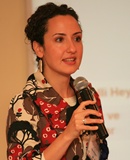In her recent post, Ellen Remmer refers to a number of factors such as role models, time and safe spaces, continuous learning and reflection to help ‘catalyse’ donors. Looking at this list from the perspective of social change leaders – whether you call them fellows, innovators, changemakers, entrepreneurs or whatever – these ‘catalytic’ factors are very much the same. And foundations that work with these leaders should be exploring more opportunities to facilitate this, no matter how off the beaten path it may be in terms of current practices.
Remmer’s post was published on the very day that I was literally and figuratively taking a hike off the beaten path – in Petra, Jordan – while engaging in facilitated personal and professional reflection. The trip was organized as part of a meeting hosted by Synergos to bring together their Senior Fellows and Arab World Social Innovators. They extended an invitation to the Sabanci Foundation and a few of Turkey’s Changemakers (a programme run by Sabanci Foundation) to join this journey and observe how they apply their ‘Bridging Leadership’ and ‘Collaborative Action’ practices. These are methods and tools to create safe spaces and help individuals and groups explore their personal worldview, purpose and leadership style, and access deeper levels of self-knowledge and awareness, while also promoting peer learning and consulting.
And just a few days later, on the other side of the world, I received news that Stanford University was about to launch their new Program on Social Entrepreneurship, led by Kavita Ramdas, the former president of the Global Fund for Women. This programme also aims to provide ‘spaces’ for social changemakers from all over the world to reflect and take their efforts to the next level while sharing their experience and know-how to inspire and motivate others. However different in context these two programmes may be, they share several of the factors that Remmer refers to as being catalytic for donors.
These factors are about the journey, not the destination. This does not imply a lack of concern for outcomes by any means; on the contrary, it recognizes that outcomes are also obtained along the way – as long as we know to look for them. And those are the outcomes that can be applied to increase your chances of arriving at the intended destination.
These days we are grappling with the balance between journey and destination at the Sabanci Foundation. It’s been nearly five years since the foundation developed a strategy and new set of programmes to engage in partnerships on rights-based programmes, provide grants to NGOs working on social justice, and increase the visibility of ‘changemakers’ all across Turkey. Taken together, the foundation has supported more than 125 individuals and NGOs to date.
As many foundations do, the first priority was determining how to track progress and measure the impact of individual projects and programmes. ‘Are projects reaching their intended destination?’ and ‘How does Sabanci Foundation’s support facilitate this impact’? are questions that are seemingly simple to ask but incredibly complex to answer. Yet in search of these answers, the awareness of the value of the journey itself has also become more apparent. I suspect many can recall instances in which a project may not have reached the predetermined goal but was none the less incredibly valuable in terms of learning for future success.
A well-known and frequently used African proverb states that if you go alone you go quickly, if you go together you go further. Foundations that appreciate the value of the journey should contribute not only to the personal and professional development of these individuals and institutions but also to strengthening the social bonds and connective tissue between them (which Peggy Dulany, Chair of Synergos, compares to mycelium or the roots of mushrooms).
Yet in order to explore these possibilities, we have to look at this work with an open mind and heart. This approach will likely require going off the beaten path of technical training and evaluating impact, and pursuing one that is less travelled yet perhaps one of the most important factors to catalyse greater impact.
Filiz Bikmen is director of programs and international relations at the Sabanci Foundation and a member of the Governing Council of the European Foundation Centre.




Comments (1)